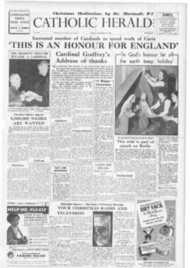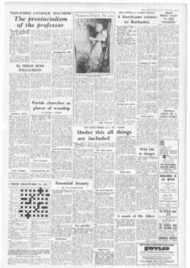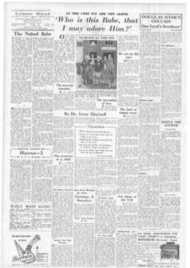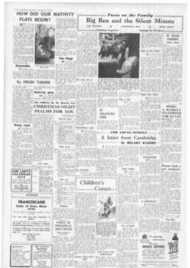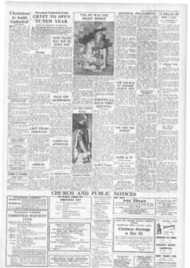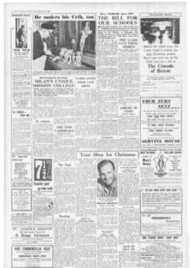Page 2, 19th December 1958
Page 2

Report an error
Noticed an error on this page?If you've noticed an error in this article please click here to report it.
Tags
Share
Related articles
`stark Lunacy' To Change This Border
Polish Bishop's Protest Against The
Millions Of Poles May Become "ex-human Beings"
Jews In Poland Polish Jew's Exposition
Pairl
Poland and Germany
S1R,-In Mr. Robert Nowell's article about my book " Poland and Germany", the crucial point about the Oder-Neisse problem is that the territories have been inhabited by Poles, 7.3 millions of them, for 13 years; that a million Polish children have already been born there; and that these people, who received their land and their jobs as a (very inadequate) compensation for their Previous losses. spoliations, and sufferings, have put into the rehabilitation of the territory a tremendous amount of toil.
The transfer of these territories to Poland and the expulsion of the German part of their population was decided by America, Britain and Russia at the Potsdam conference in which Poland did not take part. A fait accompli was created for which it is not Poland who is responsible. The historical and other arguments which support the case of Poland in this matter have in comparison with this only a subsidiary importance.
Mr. Nowell puts in doubt the fact that the territories are really inhabited and properly used by the Polish settlers and asks what is the source of the statistical data which I quoted. I reply that theonly available official data come from Government sources and it is true that the Government is Cornmunist.
But they are corroborated by information from all the people who know these territories, and of whom one can meet hundreds in London. The German opinions to the contrary are not based on any statistical data at all and hardly on any eye-witness accounts.
Mr. Nowell says that, according to German sources, only the cities and larger towns have grown, but that the fields are going to waste and villages are half deserted. He says that I claim they are better used now than it was in German times.
This is not correct. I claim that the production of coal, steel, etc.. is larger now than it was in German times, but that the production of the four principal grains in the years 1953-1955 was still only at 71 per cent. of the pre-war average.
But one cannot forget the great battle which raged on these territories in 1945, as well as the German scorched-earth evacuation and the Russian locust-like occupation. The agriculture had to be rebuilt without buildings (which were burned), without machirtery, horses. cattle. seeds. manure, and on a land with 8,750,000 acres of minefields.
In these conditions-and under Communist rule-the Polish peasant has done miracles. To expel him now would be a cruel and revolting injustice.
Please do not forget that the Polish peasant is a Catholic and defends his faith very bravely. And that he has suffered very much and merits some sympathy from Catholics throughout the world.
The aim of making Germany a Catholic country is a spiritual aim, not a political one. This is just the same as with the conversion of Russia. These are very longterm aims.
It would be wrong if English Catholics were to clothe their political sympathies concerning Germany with religious justification. Western Germany will be
Catholic as long as it is not unified with Eastern Germany. Germany as a whole is a predominantly non-Catholic and even antiCatholic nation, and will remain such.
By the way, it is not at all sure that even Western Germany will always remain in the Western camp. The anti-Adenauer opposition, as all Western-German elections show, is now in a minority, but it is strong and may one day become a majority.
I implore the English, and especially English Catholics, to try -in accordance with the principle of audiatur a altera pars--to learn what the Poles have to say in these Important matters-for example, by carefully reading my hook.
At present, any balanced opinion about Polish-German problems cannot be formed in this country simply because the Polish point of view is practically not known -neither to the population at large nor to most of the experts.
Jedreei Giertych.
16 Belmont Road. N.I5. Mr. Nowell writes "1 am glad that Mr. Giertych now says that the crucial point about the Oder-Neisse problem is whether or not it is possible to change the 1945 settlement.
this is his view, why did he devote so much space in his book to historical and other arguments defending the westward expansion et Poland after the war? I agree that Poland was not responsible for the original decision, but she seems to have accepted it with remarkable alacrity.
" If we are to be able to form a balanced judgement on the question. it is essential that we should possess the full facts about what is actually happening in the OderNeisse territories. This is impossible. That is why I emphasised that these facts are in dispute and that Polish Government statistics should be treated with caution, and why I refrained from drawing any conclusion.
" All that we can do, apparently, is to subtract a certain amount from the Polish claims because of Polish national pride, while also subtracting from German claims to allow for wishful thinking.
"I have not forgotten that the Polish peasant is a Catholic and a staunch defender of the Faith. So were the German peasants of Ermland. The important thing here is to disentangle loyalty to the Church from loyalty to one's country.
" Finally, Germany in the past has been a predominantly nonCatholic and even anti-Catholic nation. I agree with Mr. Giertych that this is so. But today things are changing. The centre of gravity Continued in next column
blog comments powered by Disqus


